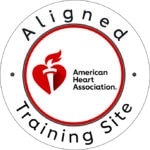Hesperia CPR, ACLS, BLS, PALS, AND FIRST AID CLASSES
WHAT COURSES DOES RESCUE CPR OFFER IN THE CITY OF HESPERIA?
We provide training in CPR, First Aid, BLS, ACLS, PALS, ECG (Electrocardiogragh) Interpretation, 12 Lead Recognition and more! Courses are offered in several convenient formats including a blended learning option as well as traditional all in classroom courses.
WHAT DO THESE TERMS STAND FOR AND WHAT DO THEY MEAN?
CPR stands for Cardiopulmonary Resuscitation, and is used to revive someone who has become unconscious due to Cardiac Arrest, choking, drowning, or another medical emergency.
Who Should Learn CPR? Any person can learn CPR. The course is designed to have no medical background necessary and can be performed by anyone. Most commonly, teachers, security guards, personal trainers, corporate managers, parents, and baby sitters take this course.
Rescue CPR's Hesperia CPR course will educate you on how to properly perform CPR to an adult, child or infant. How to use an AED Defibrillator, as well as how to give aid to a conscious and unconscious choking person.
First Aid with RescueCPR Hesperia will teach you how to help someone who has fallen, been burned, or injured. You will learn how to provide basic medical care to wounds and broken bones. You will also learn how to detect and respond to someone having a seizure, asthma attack, allergic reaction, as well as choking and temperature-related injuries such as heat stroke and frost bite.
Who Should Learn First Aid? Everyone! All citizens of Hesperia and nearby areas should learn the methods used in our first aid course because you never know when an emergency is going to happen.
BLS means Basic Life Support, and is the CPR course for all medical professionals. There are two types of CPR courses: CPR and BLS. BLS is designed for anyone working in the healthcare field that may have access to medical equipment that a layperson does not.
Who Should Know BLS? All medical persons and first responders should understand BLS, including nurses, doctors, fire fighters, paramedics, dentists, emergency medical technicians and all medical personnel.
Our BLS training class will teach you how to give CPR to an adult, child or infant, how to use an AED Defibrillator, how to help a conscious and unconscious choking victim, how to respond to a Cardiopulmonary emergency, and how to use basic CPR supplies such as a bag mask, valve and others.
ACLS stands for Advanced Cardiac Life Support, and is used when someone is going through Cardiac Arrest and has become unconscious.
Who Should Learn ACLS? All healthcare and medical professionals that have the chance of encountering a cardiopulmonary emergency should have their ACLS certification.
Rescue CPR's courses will educate you on how to recognize and treat a Cardiac Arrest victim, how to manage a victim’s airway, a review of BLS, management of acute coronary syndromes and stroke, and how to be a team leader during an emergency code situation.
PALS means Pediatric Advanced Life Support, and was created to aid critically ill children and infants.
Who Should Understand PALS? All persons in the medical and health fields that may work with infants or children in Hesperia, including doctors, nurses, and paramedics.
Our PALS course will teach you how to properly respond to a pediatric emergency, how to help a child that has stopped breathing, a review of infant and child BLS, and practice responding to “real life” emergency situations.
Whether you wish to prepare yourself for a medical career, make your community a safer place, or simply be prepared to help your new child, the courses through Rescue CPR can teach you everything you need to know to revive your patient, neighbor, colleague or family member.
Give us a call in our office today and schedule a time to attend one (or all!) of our incredibly valuable classes!
The American Heart Association strongly promotes knowledge and proficiency in all AHA courses and has developed instructional materials for this purpose. Use of these materials in an educational course does not represent course sponsorship by the AHA. Any fees charged for such a course, except for a portion of fees needed for AHA course materials, do not represent income to the AHA.

